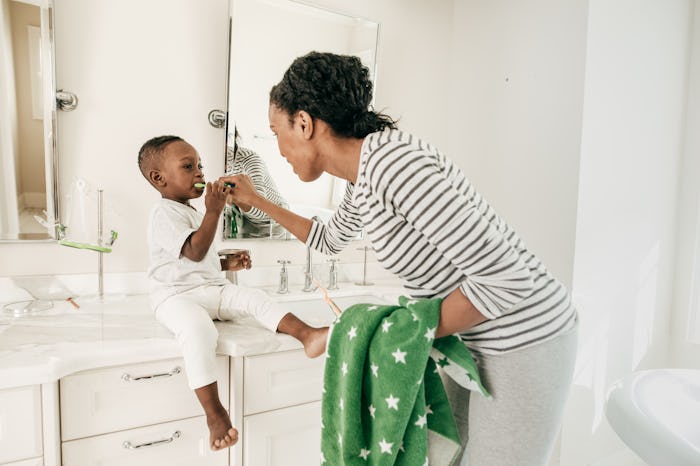Life

Here's What Dental Experts Want You To Know About Fluoride & Toddlers
When it comes to dental care, experts agree that starting early to develop proper oral hygiene habits is key. A variety of products aim to make brushing fun for little ones, but not all are created equal. What you need to know about fluoride and toddlers can make a difference when it comes time to choose from the array of candy-colored and bubblegum-flavored tubes of toothpaste on the market.
"Fluoride is present in some foods and naturally occurs in varying amounts in water sources such as lakes and rivers. It’s also added to some oral care products such as toothpastes — which has not been without controversy," Dr. Kami Hoss, CEO and co-founder of The Super Dentists, the largest dental practice in southern California, tells Romper. "Advocates of fluoride refer to 'systemic' benefit of strengthening the tooth enamel when fluoride is taken in from foods, beverages, or dietary supplements. They also refer to the 'topical' benefit of fluoride in toothpastes in strengthening and remineralizing the enamel in the early stages of tooth decay."
While the American Dental Association has long-recognized fluoride as "safe and effective in preventing tooth decay for both children and adults," the mineral can pose a threat of toxicity if too much is ingested. This is why pediatric dentists are often cautious about young children and fluoride consumption. Learning more about fluoride use, the benefits, and the risks is vital for toddler parents.
You Can Start Using Fluoride Sooner Than You Think
Although your gut instinct may be to hold off on fluoride toothpaste until your toddler is older, Dr. Suzy Tavana, AAPD National Spokesperson and President of the California Society of Pediatric Dentistry, tells Romper that you can actually use it as soon as your child's first tooth erupts.
"According to the American Academy of Pediatric Dentistry, as long as parents are brushing the teeth of their young children and helping to control the amount of toothpaste on the toothbrush, young children can start protecting that new enamel right away," Tavana explains.
A Little Goes A Long Way
"Fluoride toothpaste protects teeth because it 'heals' cavities by hardening the enamel and preventing the spread of bacteria," Tavana says. "But this is not one of those situations where more is better." A small smear of toothpaste, no more than the size of a grain of rice, is the general recommendation for toddlers using fluoride toothpaste.
Tavana recommends that parents check the amount of fluoride in their water and keep an eye on their children's use of toothpaste, and lean on recommendations from their pediatric dentist when it comes to a toddler's fluoride intake, too.
"I always tell the parents in my office, 'It should never look like a washing machine inside their mouth!' A little fluoride goes a long way," she adds.
Use Quality Products
Because the oral care products you use can make a difference in their overall health and wellness, experts recommend looking to your child's dentist when it comes to choosing a toothpaste. They'll be able to point you toward quality products that meet your toddler's specific needs.
"Since children’s oral health needs vary, and we can assume toddlers would ingest some toothpaste during brushing, I would caution all parents against choosing a random over-the-counter toothpaste," Hoss tells Romper. "It’s important that you discuss the particular needs of your children with their pediatric dentist, and only use oral care products that have been customized for them."
Fluoride Risks Are Real
"Too much fluoride from any source over a long period of time can potentially cause dental fluorosis, which is a change in the color and appearance of the enamel," Hoss says. "Additionally, if fluoride is swallowed in large amounts, it can lead to serious toxicity."
This is why the U.S. Food and Drug Administration (FDA) requires warning labels for all toothpastes to caution parents to keep toothpastes out of reach of children under 6 years of age, and not to swallow more than is required for brushing.
"The FDA warning is particularly concerning regarding toddlers since a lot of toothpastes marketed to young children are flavored to taste good," Hoss explains. "It’s hard enough to ask a toddler not to swallow something that’s in their mouth for two minutes (which is the length of time they need to brush), let alone when it has an irresistible flavor like candy, fruit, or bubble gum."
Yes, Toddlers Do Need Some Fluoride
If you're on the fence about fluoride consumption, it's important to note that the mineral is actually something that can help keep your child's teeth healthy, but it's recommended to have consistent check-ins with their pediatric dentist to manage the amount they need. "Fluoride encourages 'remineralization,' a strengthening of weakened areas of tooth enamel," Tavana says. "It also affects bacteria that cause cavities, discouraging acid attacks that break down teeth."
Pediatric Dentists Can Help Determine Fluoride Needs
"Children aged 6 months to 16 years may need fluoride supplements if they drink water that is not optimally fluoridated," Tavana says. "The pediatric dentist considers many different factors before recommending a fluoride supplement, including your child's age, risk of dental decay, and the different liquids in your child’s eating habits."
Seeing a pediatric dentist specifically is important in determining not only how much fluoride your child needs, but helping ensure they have complete oral care. "They have two to three years of additional training in which they are able to detect enamel deficiencies early, and guide families through the preventive steps they can take to ensure their children grow up cavity-free," Tavana tells Romper.
Experts:
Dr. Kami Hoss, CEO and co-founder of The Super Dentists
Dr. Suzy Tavana, AAPD National Spokesperson and President of the California Society of Pediatric Dentistry